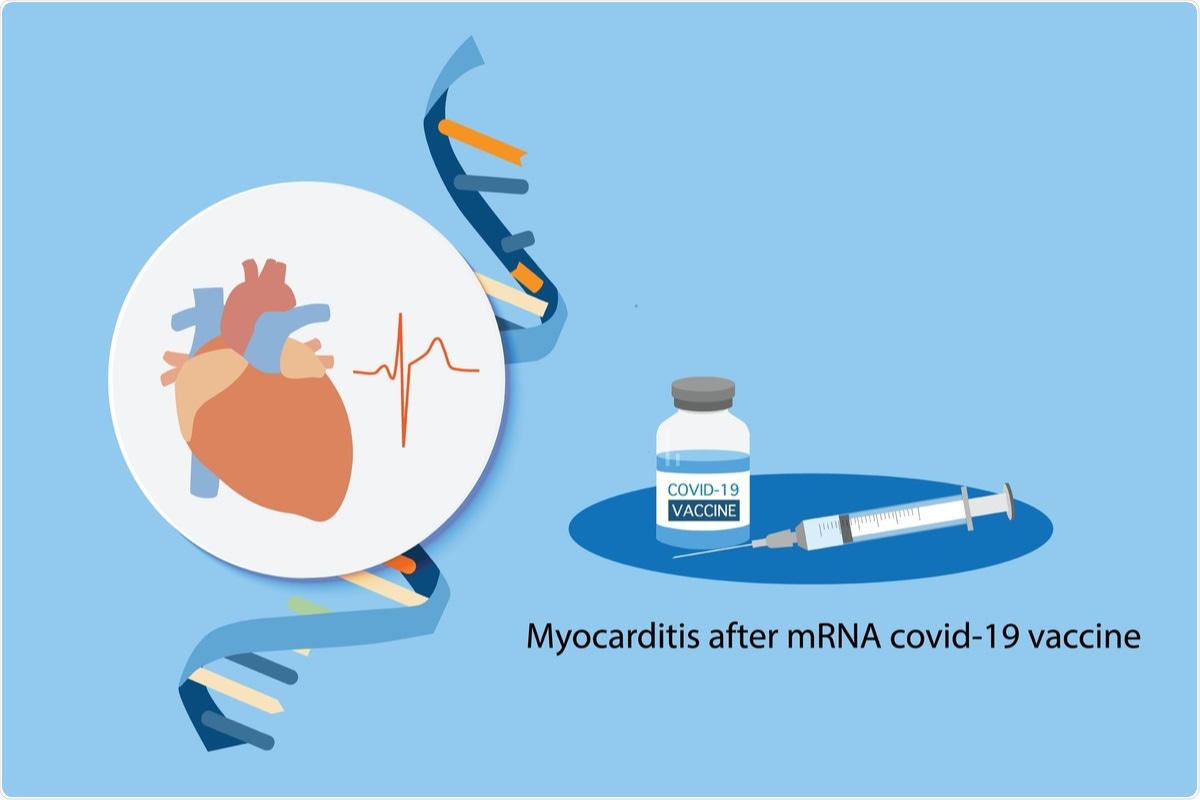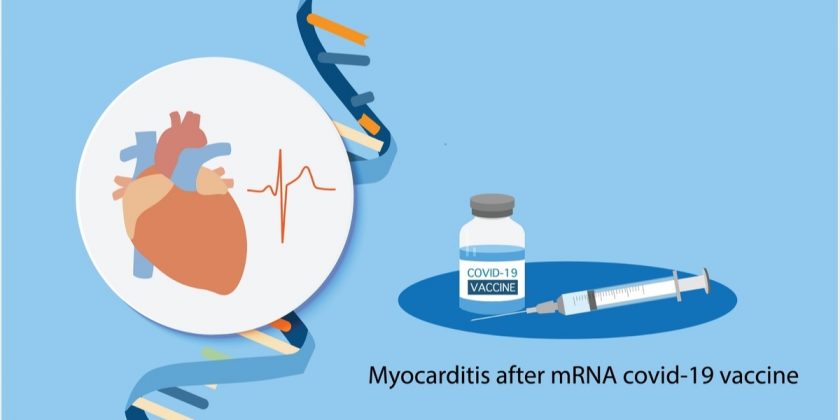Several messenger ribonucleic acid (mRNA) vaccines have been developed to combat the ongoing coronavirus disease 2019 (COVID-19) pandemic, of which includes the Pfizer-BioNTech BNT162b2 and Moderna mRNA-1273 vaccines. However, a higher than expected number of myocarditis cases were submitted to the United States Vaccine Adverse Event Reporting System (VAERS) post-vaccination in May 2021, with an increased frequency of these cases occurring in young males.

Study: Risk of Myocarditis and Pericarditis Following BNT162b2 and mRNA-1273 COVID-19 Vaccination. Image Credit: Teeradej / Shutterstock.com
The United States Food and Drug Administration (FDA) also added warnings regarding the occurrence of myocarditis and pericarditis due to the BNT162b2 and mRNA-1273 vaccines in June 2021. Myocarditis has also been reported in Israel, Canada, and several European countries following the administration of both BNT162b2 and mRNA-1273 vaccines.
The Vaccine Safety Datalink (VSD) also reported an increase in the incidence of myocarditis and pericarditis by approximately ten-fold between zero to seven days post-mRNA vaccination as compared to 22 to 42 days post-vaccination. However, it is not clear whether the risk of myocarditis and pericarditis differs by mRNA vaccine product.
A Preprints with The Lancet study assesses whether the risk of myocarditis and pericarditis differs between the two mRNA vaccines. To this end, the researchers updated previously reported comparisons of myocarditis and pericarditis incidences during a risk interval post-vaccination as compared to a later comparison interval.
About the study
The current study included participants between the ages of 18 to 39 years who were members of integrated healthcare organizations within the VSD and were vaccinated with either of the aforementioned mRNA vaccines. Potential causes of myocarditis and pericarditis were evaluated in the emergency department (ED) and inpatient settings one to 98 days after the patients had received the first or second dose of an mRNA vaccine. Positive COVID-19 cases that were identified by molecular assay or diagnostic code 30 days before diagnosis were excluded from the study.
Thereafter, all potential cases underwent a medical record review that included information on the timing of symptom onset, verified diagnoses, and clinical data on the patients. Clinician adjudication (MEO, TTB) verified whether the cases met the U.S. Centers for Disease Control and Prevention (CDC) case definition of confirmed or probable myocarditis, pericarditis, or myopericarditis.
Study findings
Taken together, 95 potential cases of myocarditis and pericarditis were identified between zero to seven days period following vaccination. The medical record review and adjudication verified 14.2 cases per million doses after the BNT162b2 vaccine and 21.1 cases per million doses after the mRNA-1273 vaccine.
The incidence per million first doses was reported to be 4.7 for BNT162b2 and 9.7 for mRNA-1273, whereas the incidence per million second doses was 24.1 and 33.0 for the BNT162b2 and mRNA-1273 vaccines, respectively.
Most of the cases were found to be of myopericarditis, with a higher number of pericarditis cases reported after mRNA-1273 vaccination and a higher number of myocarditis cases reported after BNT162b2 vaccination.
The median age of the cases was 22 years and 23.5 years for the BNT162b2 and mRNA-1273 vaccines, respectively. Regardless of the vaccine, most cases were found to occur in males and after the second vaccine dose. Most patients were admitted to the hospital for a median length of stay of one day, while none were admitted to the intensive care unit (ICU).
The average rate ratios (RR) for the zero- to seven-day risk interval were 6.9 and 9.2 after BNT162b2 and mRNA-1273 vaccination, respectively. RRs comparing risk versus comparison interval were 14.3 and 18.8 after the second dose of the BNT162b2 and mRNA-1273 vaccines, respectively.
Direct head-to-head comparison during the zero to seven days post-vaccination indicated that incidence of myocarditis and pericarditis was 1.61 times higher after mRNA-1273 vaccination as compared to BNT162b2 vaccination. Furthermore, the incidence of myocarditis was 1.48 times higher after receiving the mRNA-1273 vaccine as compared to BNT162b2 following the second dose. Additionally, for male restricted analyses, the incidence was found to be 1.50 times higher after mRNA-1273 vaccination as compared to BNT162b2 vaccination after the second vaccine dose.
Conclusions
The current study highlights that both mRNA vaccines against COVID-19 were associated with a significantly increased risk of myocarditis and pericarditis, especially between zero to seven days after the second vaccine dose was administered. Most cases of myocarditis and pericarditis were found to be mild and resolved after a short hospital stay.
The risk of myocarditis and pericarditis was also found to be higher following vaccination with mRNA-1273 than BNT162b2. However, continuous monitoring of the impact of vaccines is required, especially after receipt of booster doses.
Limitations
Case identification in the current study was limited to those who received ED or inpatient care and had a diagnosis code that was specific to acute myocarditis or pericarditis. A second limitation was that the current study involved only 79 verified cases of myocarditis and pericarditis between zero and seven days post-vaccination.
The current study might also have some detection or diagnosis bias due to increased awareness of potential myocarditis after mRNA vaccines in both the public and healthcare providers.
*Important notice
Preprints with The Lancet / SSRN First Look publishes preliminary scientific reports that are not peer-reviewed and, therefore, should not be regarded as conclusive, guide clinical practice/health-related behavior, or treated as established information.
- Goddard, K., Lewis, E., Fireman, B., et al. (2022). Risk of Myocarditis and Pericarditis Following BNT162b2 and mRNA-1273 COVID-19 Vaccination. The Lancet. doi:10.2139/ssrn.4059218.
Posted in: Medical Research News | Medical Condition News | Disease/Infection News | Pharmaceutical News
Tags: Assay, Coronavirus, Coronavirus Disease COVID-19, Diagnostic, Food, Frequency, Healthcare, Hospital, Intensive Care, Myocarditis, Pandemic, Pericarditis, Ribonucleic Acid, SARS-CoV-2, Vaccine

Written by
Suchandrima Bhowmik
Suchandrima has a Bachelor of Science (B.Sc.) degree in Microbiology and a Master of Science (M.Sc.) degree in Microbiology from the University of Calcutta, India. The study of health and diseases was always very important to her. In addition to Microbiology, she also gained extensive knowledge in Biochemistry, Immunology, Medical Microbiology, Metabolism, and Biotechnology as part of her master's degree.
Source: Read Full Article
